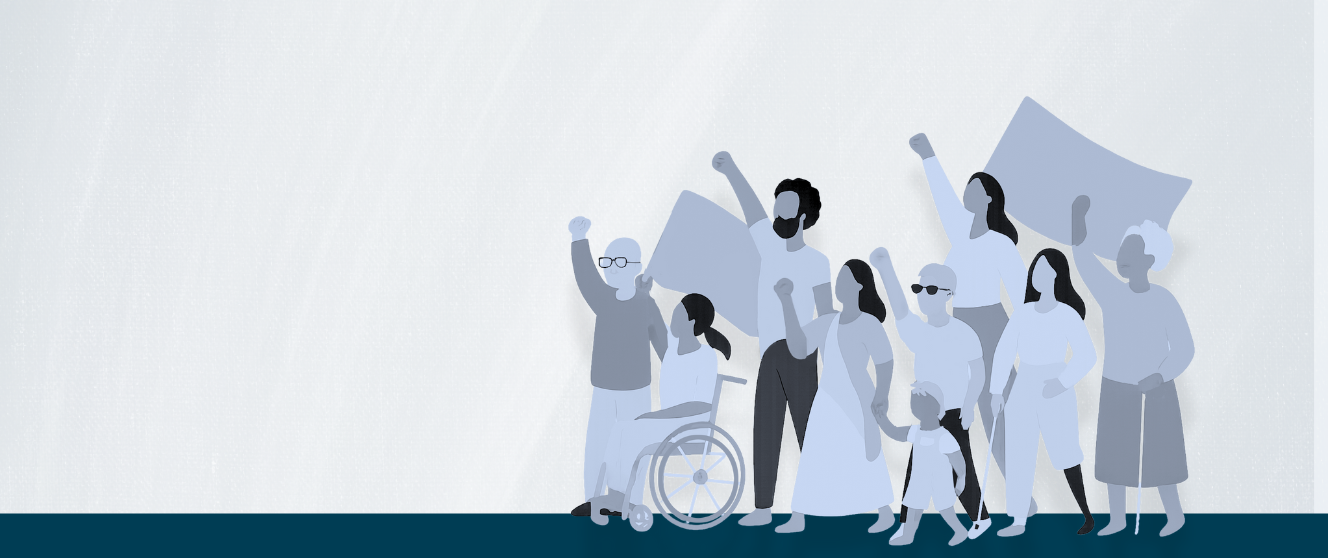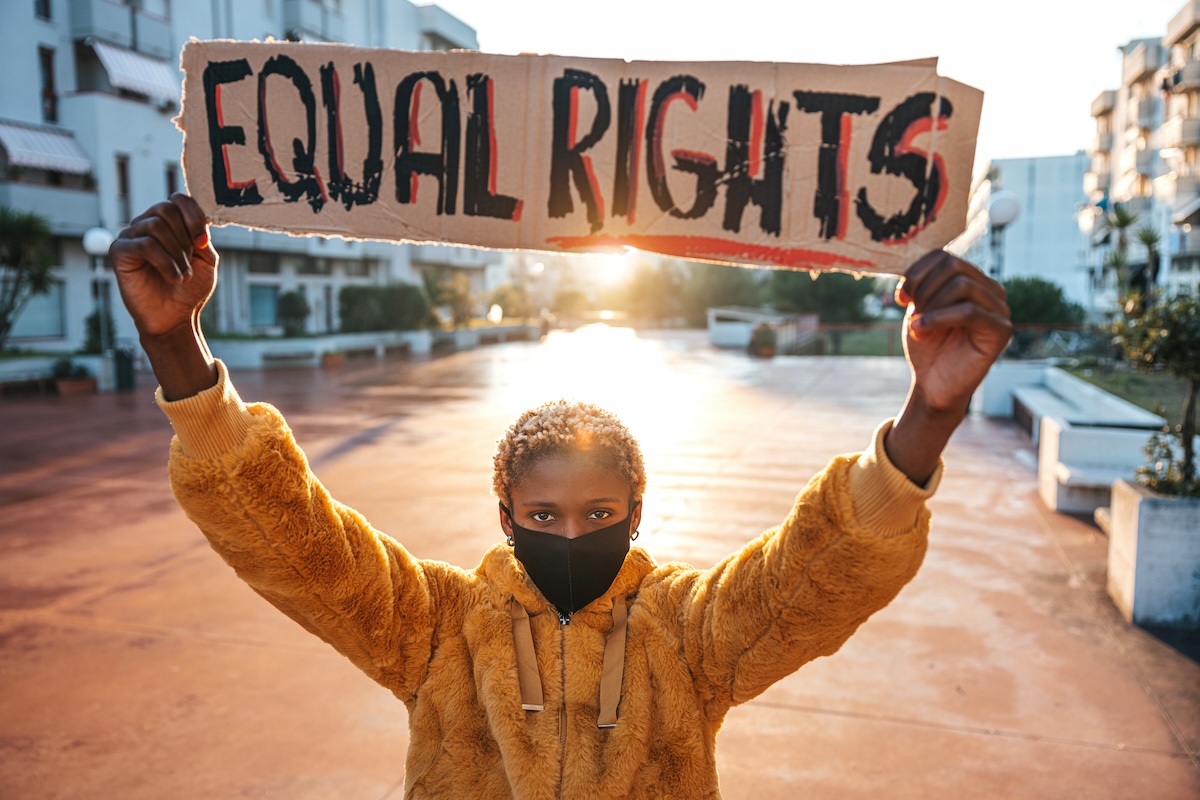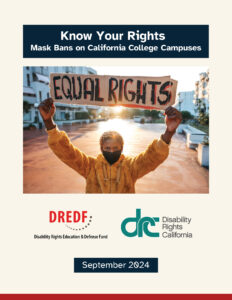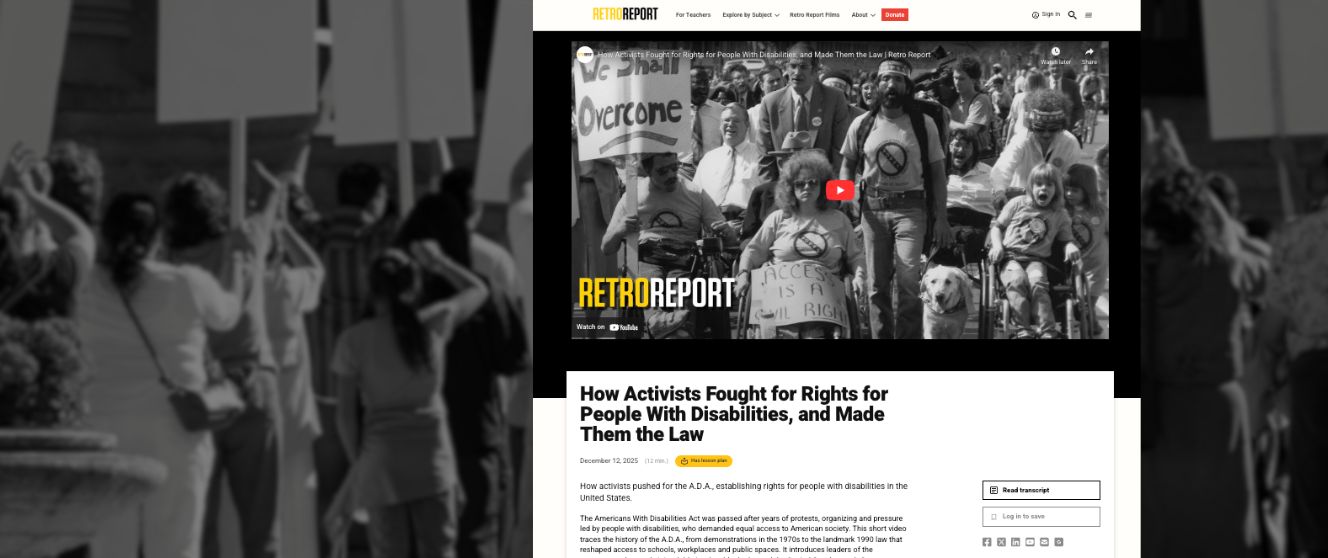
Overview
Campuses in California have been putting “mask bans” for students into their policies and procedures. Campus officials say they want these bans to prevent students from hiding their identities. They say they need mask bans for campus safety. They use campus police to enforce these bans.
These bans target student protestors and unfairly harm students with disabilities who use masks for their health and safety. Campus police cannot tell the difference between a protestor hiding their identity and a disabled person wearing a mask for health reasons. They would need to ask invasive questions about the person’s disability and medical information to know when they can enforce the mask ban. Sometimes, a student with a disability may wear a mask for health reasons while participating in a protest. Disabled people are at higher risk of violence when interacting with law enforcement, and law enforcement should not be making decisions about who can wear masks on public campuses.
This guide was created to tell you about your rights when it comes to wearing a mask on campus and to give you information on what to do if those rights are violated. This Know Your Rights: Mask Bans on California College Campuses guide was developed in collaboration between Disability Rights Education & Defense Fund and Disability Rights California in September 2024.
Disclaimer: This guide is not a substitute for legal advice. Speak to a lawyer if you are uncertain of your rights regarding a protest, if you have an interaction with the police, or become involved in the criminal-legal system.
FAQs
1. My campus has a mask ban. Can I still wear a mask on campus?
Yes, you can still wear a mask on campus. You have the right to health and safety on campus. You have an equal right to choose whether to wear a mask in public, and you should not be targeted for this choice.
2. If someone asks me why I am wearing a mask, do I have to answer? Do I have to disclose my disability?
You do not need to disclose specifics about your disability or diagnosis. It may be helpful to let the person asking know you have a disability by simply stating “I have a disability and need this mask for my health and safety.”
3. If a professor asks me to remove my mask, do I have to?
You have the right to wear a mask on campus. You can explain to the professor that you are wearing a mask for health and safety reasons.
4. Are there laws that protect my right to wear a mask?
Yes. There are state and federal laws that prohibit discrimination.
If you need to wear a mask for a disability-related reason, then prohibiting you from wearing a mask for that reason is discriminatory.
Federal laws that protect your right to wear a mask include the Americans with Disabilities Act (42 U.S.C. §§ 12101 et seq.) and Section 504 of the Rehabilitation Act of 1973. (29 U.S.C. § 701 et seq.).
Title II of the Americans with Disabilities Act (ADA) prohibits disability discrimination in all services, programs, and activities provided by public institutions. Most universities within California are considered public institutions, including the University of California system, the California State University system, and the California Community College system.
Title III of the ADA prohibits disability discrimination by private institutions of higher education. Under both Title II and Title III, you have the right to ask for a “reasonable modification” or “reasonable accommodation” if needed to access a university or college’s services, programs, activities, or facilities. See Question 8 for more information about reasonable modifications and reasonable accommodations.
Section 504 of the Rehabilitation Act prevents disability discrimination from public entities that get federal funding. Most universities within California receive federal funding, including federal financial aid grants. This includes the University of California system and the California State University system. You have the right to ask for reasonable accommodations under Section 504. Your rights under Section 504 are similar to your rights under the ADA.
There are also California laws that protect you from discrimination. California Government Code Section 11135 applies to the state, state agencies, and programs and activities that receive state funding. Most California universities and colleges receive state funding. (Cal. Code Reg. §§ 14020(m)). This includes the University of California system, the California State University system, and the California Community College system. Section 11135 prohibits discrimination based on several protected characteristics, including: “mental disability, physical disability, [and] medical condition.” Recently, regulations were adopted for Section 11135 that clarify that its statutory protections also apply to people with immunological health issues. (Cal. Code Reg. §§ 14020(4)(A); 14020(12).).
Under Section 11135 and its implementing regulations, California universities and other state-funded schools are not allowed to have policies that discriminate based on disability, including mask bans.
There may be other laws applicable to your situation.
5. I work on a campus with a restrictive mask policy. Are there laws that protect my right to wear a mask at work?
Yes. California Department of Industrial Regulations has non-emergency COVID-19 policies in place through at least February 3, 2025. According to this policy, employers must allow workers to wear face coverings if the worker chooses to do so (CCR Title 8 § 3205(f)(4)).
6. Are there other laws that may apply to my situation?
Yes, there may be other laws that apply depending on your school and the service, program, activity, or facility involved. For example, federal and state fair housing laws would apply to your school’s housing programs, and state laws that apply to private businesses and other public places may apply to your school or entities doing business on campus. You are encouraged to consult with an attorney for legal guidance on your particular situation. Nothing in this guide is intended to provide individualized legal advice.
7. My campus is implementing a mask ban in an attempt to limit protests. Can I still wear a mask at a protest?
Yes, you can still wear a mask at a protest. In addition to disability-specific protections for wearing a mask, the First Amendment protects your right to free speech. This includes the right to protest anonymously.
However, the campus mask bans may result in penalties for wearing a mask to conceal your identity at a protest. If you are wearing a mask for health or disability, you should not be subject to these penalties. However, law enforcement or campus officials may not enforce this fairly. You may want to consider telling authorities who question your mask-wearing, “I am wearing a mask to protect my health,” but you should be prepared that it may not prevent harassment.
For more information on your rights when protesting, refer to Know Your Rights for Disabled Protestors Guide.
8. What is a reasonable accommodation/reasonable modification?
A reasonable accommodation or reasonable modification is a change to a rule, policy, or practice that is necessary to give a person with a disability equal access to a service, program, or facility at a school. Schools must provide such changes unless it would result in an undue financial or administrative burden on the school; fundamentally alter the nature of the services, programs, or activities of the school; or pose a direct threat to the health or safety of others. The terms “reasonable modification” and “reasonable accommodation” are interchangeable in the context of schools and mask bans. We use the term “reasonable accommodation” in the remainder of this guide.
For more details on reasonable accommodations in higher education settings, check out Disability Discrimination Fact Sheet: Colleges and Universities.
9. How can I request a reasonable accommodation to wear a mask?
To request a reasonable accommodation from a mask ban because of your disability, you must explain why wearing a mask is necessary for you to access the services, programs, activities, or facilities of the school. You do not have to give the school a diagnosis or go into details about your disability or medical condition, but you do have to explain the connection between the accommodation you are requesting and your disability-related need.
You can make your request verbally or in writing, but it is generally better to make the request in writing so that you have proof of your request.
If you are stopped by someone for wearing a mask, you may only be able to express the accommodation verbally. You should later document this as soon as possible in writing to your appropriate Student Disability Services office on campus.
If you know you must wear a mask on campus, schedule an appointment to get this accommodation documented in your accommodation plan. You can then show a copy of this document if you get stopped.
10. If I feel that I am being harassed by students, faculty, or staff for wearing a mask, what should I do?
Harassment based on disability is illegal under both federal and California law, including the laws referenced above. If you are being harassed, document your experience. If a faculty member is responsible, you can go to a higher-level employee (supervisors and managers). Document discussions up the chain of command of different employees and staff you talk with, and document these interactions in writing, pictures, texts, or with witnesses. Save a copy of all emails, complaints, and documents. You can also contact internal resources within the university system in writing to make a record of what you experienced. Then, also contact external resources such as state and federal agencies who accept complaints and let them know your experience on campus.
11. If a police officer stops me for wearing a mask, what should I do? What are my rights when interacting with law enforcement?
You have the right to wear a mask on campus. You can explain to the police officer that you are wearing a mask for health and safety reasons. Campus police are required to follow state and federal anti-discrimination laws, including the Americans with Disabilities Act (ADA).
If the officer continues to request the removal of the mask, you can ask for a reasonable accommodation verbally. You do not need to state your disability, but you must provide the “why” of your need to wear a mask to make a reasonable accommodation request. It is important to document your experience. Videoing or writing down your experience afterward is helpful. Write down the police identifying information, including the name or badge number of the law enforcement you interact with if possible. You have the right to request a copy of police reports for your records.
12. If I am arrested or detained, can I continue to wear a mask?
If you are arrested or detained, you can verbally request a reasonable accommodation to continue to wear a mask. For more details on reasonable accommodations when interacting with law enforcement, check out Your Rights! People with Disabilities and Law Enforcement.
13. How can I raise concerns I have to the university system?
If you have been discriminated against, you have the right to pursue written internal complaints to document your experience. You can use these internal complaints as evidence in external complaints. There are several avenues you can pursue:
The resources below are specific to the University of California system. If you are at a different university, you can look for similar resources at your campus.
UC Police complaints: Complaints, usually called “Civilian grievances” can be collected by your campus’s police department. You should receive a timely response to your complaint. You may be able to make an anonymous complaint.
- All civilian complaint data for UC schools is located here: Community safety: Civilian complaints | University of California
- Campus police must report all improper police actions under Penal Code 832.5.
- There is no deadline to make a complaint, but it is best to do so as soon as possible.
- Contact Workgroup members and your campus’s Responsible Officer in writing to report violations of the UC Community Safety Plan
- List of Workgroup Members
- List of Campus Responsible Officers responsible for implementing the Community Safety Plan.
Report your experience in writing to the Systemwide Office of Civil Rights
- File a report here: https://uctitleix.i-sight.com/portal
- Reports can be made anonymously.
- There is no deadline to make a complaint, but it is best to do so as soon as possible.
Contact or report an incident to your Campus ADA office:
- List of all ADA offices here: https://www.ucop.edu/ethics-compliance-audit-services/compliance/american-disabilities-act-ada/campus-ada-coordinator-contacts.html
- Reach out to the ADA coordinator at your specific UC school.
Contact or report an incident to your Campus Nondiscrimination Offices
- A list of anti-discrimination offices is located here: Campus Offices for Anti-Discrimination
- Some UC schools may also have an “anti-bias” team such as the University of San Francisco’s Bias Education and Resource Team (BERT). If your school has this, reach out to them to report an issue in writing.
14. Are there outside complaint resources to pursue if I feel I have been discriminated against?
Yes.
California Civil Rights Department (CRD) Complaint
- For state law claims
- Formerly known as the Department of Fair Employment and Housing (DFEH)
- How to file a complaint: https://calcivilrights.ca.gov/complaintprocess/
- File within one year of the alleged unlawful practice
Department of Education Office of Civil Rights Complaint (OCR)
- For federal law claims
- How to file: https://www2.ed.gov/about/offices/list/ocr/complaintintro.html
- Form to fill out: http://www.ed.gov/about/offices/list/ocr/complaintintro.html
- File within 180 days of the last act of discrimination
U.S. Department of Justice Complaint (DOJ)
- File a complaint here: https://civilrights.justice.gov/
- Can be filed at any time, but it is best to file as soon as possible
Legal remedies
You have the right to file a lawsuit if you have been discriminated against as a member of a protected class. Lawsuits have time limits to filing once a discriminatory act has occurred and can be as little as one year. You may wish to reach out to an attorney to receive information and time limits on your particular claims.
15. Where are other resources to learn more about this topic?
- Your rights as a person with a disability and law enforcement | Disability Rights California: https://www.disabilityrightsca.org/publications/your-rights-people-with-disabilities-and-law-enforcement
- Know Your Rights for Disabled Protestors Guide | Disability Rights Education and Defense Fund: https://dredf.org/know-your-rights-for-disabled-protestors-guide/
- Higher Education Overview | Disability Rights California: https://www.disabilityrightsca.org/resources/higher-education
- Your Rights and Disability Discrimination in Higher Education | Disability Rights California: https://www.disabilityrightsca.org/publications/disability-discrimination-fact-sheet-colleges-and-universities
- Know Your Rights: Deaf Rights – What to do When Dealing with the Police | ACLU of DC: https://www.acludc.org/en/know-your-rights/deaf-rights-what-do-when-dealing-police
- Know Your Rights: A guide for protesters | National Lawyers Guild: https://www.nlg.org/wp-content/uploads/2022/06/NLG-Know-Your-Rights-Booklet-2022.pdf
- Fighting for Safe Access in a Masks-Optional Healthcare Environment | Disability Rights Education and Defense Fund: https://dredf.org/adainhealthcare



